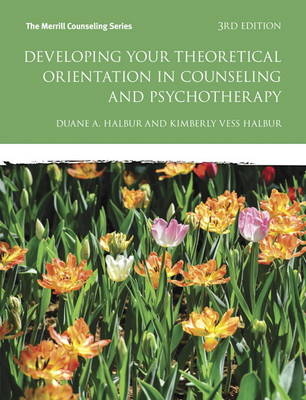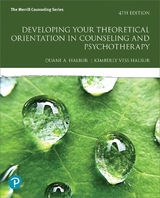
Developing Your Theoretical Orientation in Counseling and Psychotherapy
Pearson (Verlag)
978-0-13-348893-7 (ISBN)
- Titel erscheint in neuer Auflage
- Artikel merken
Dr. Duane Halbur’s research interests include the needs of school counselors, philosophical counseling, and the integration of technology in counseling. Along with teaching and writing, he works as a licensed counselor in private practice specializing in children and families in transition. Dr. Kimberly Vess Halbur’s research includes cultural competencies for the helping professions and medical fields.
Brief Table of Contents
Chapter One: Why Theoretical Orientation Is Important
Chapter Two: Incorporating Theory into Practice
Chapter Three: Top 10 Ways to Find Your Theoretical Orientation
Chapter Four: Six Schools of Thought and Their Theories of Helping
Chapter Five: Case Examples for Integrating Theory into Practice
Complete Table of Contents
Chapter One: Why Theoretical Orientation Is Important
A Personal Experience The Big Puzzle
What Is Theoretical Orientation?
The Helper’s Tool Belt
What Can A Theoretical Orientation Do For Me?
How Have Others Picked A Theoretical Orientation?
What If I’m Eclectic?
Empirically Validated Therapies: Are They Better?
Guidance From COMMON FACTORS: Do They All Work?
Once I Have It, How Can I Use It?
How Are Theoretical Orientation and Ethics Related?
The Main Points
Reflection Questions
Chapter Two: Incorporating Theory into Practice
Making Theory Useful: A Model
Theory Development
Importance of Your Life Philosophy
Life Philosophy–Its Personal
Schools of Thought
Theories
Goals and Techniques: Interventions at Work
Counselors are Diverse
Resistance to Theories: Eclectic, Integrated, or Just Don’t Know
Does It Really Work?
What to Take Home
Reflection Questions
Chapter Three: Top 10 Ways to Find Your Theoretical Orientation
Find Yourself
Articulate Your Values
Survey Your Preferences Use Your Personality
Taking the MBTI
Capture Yourself
Let Others Inspire You in Your Learning
Read Original Works
Get Real
Study with a Master
Broaden Your Experiences
Top 10 Wrap-Up
Reflection Questions
Suggested Readings and Webpages
Chapter Four: Six Schools of Thought and Their Theories of HelpingPsychodynamic School of Thought
Psychoanalytic Theory
Analytical Theory
Individual Psychology
Behavioral School of Thought
Behavioral Therapy
Humanistic School of Thought
Person-Centered
Existential
Gestalt
Pragmatic School of Thought
Cognitive Behavioral
Rational Emotive Behavioral Therapy
Reality Therapy
Constructivist School of Thought
Multicultural Counseling and Therapy
Feminist Therapy
Narrative Therapy
Solution-Focused Brief Therapy
Family Approaches School of Thought
Bowen Family Systems Therapy
Strategic Family Therapy
Structural Family Therapy
Family Therapies and Diversity
Summary
Reflection Questions
Chapter Five: Case Examples for Integrating Theory into Practice
Clinician Case Studies
Case One: Evan
Case Two: Jill
Case Three: Garrett
Case Four: Lillian
Comment on the Cases
Client Case Studies
Case One: Tony
Case Two: Nancy
Case Three: Brenda
Supervision Case Studies
Case One: Grace
Case Two: Casey
Case Three: Dominic
Summary of Supervision Case Studies
Putting It All Together
Importance Revisited
How Theory Is Found
Benefit of the ITS Model to the Field
| Erscheint lt. Verlag | 6.8.2014 |
|---|---|
| Sprache | englisch |
| Maße | 180 x 230 mm |
| Gewicht | 937 g |
| Themenwelt | Medizin / Pharmazie ► Medizinische Fachgebiete ► Psychiatrie / Psychotherapie |
| Sozialwissenschaften ► Pädagogik ► Sozialpädagogik | |
| Sozialwissenschaften ► Soziologie | |
| ISBN-10 | 0-13-348893-4 / 0133488934 |
| ISBN-13 | 978-0-13-348893-7 / 9780133488937 |
| Zustand | Neuware |
| Haben Sie eine Frage zum Produkt? |
aus dem Bereich



